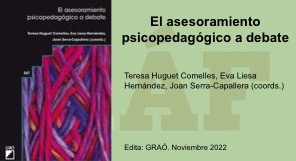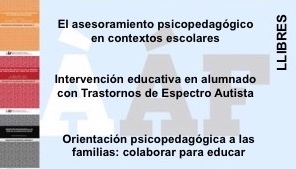Puede haber innovación sin investigación? Una propuesta desde las comunidades de indagación
DOI:
https://doi.org/10.32093/ambits.v0i50.1220Palabras clave:
Indagación educativa, Comunidad de indagación, Práctica fundamentadaResumen
La innovación, el cambio o la mejora educativa se deben promover desde los centros educativos a través de la creación de comunidades de indagación. En este artículo se explica qué es una comunidad de indagación y se argumenta la necesidad de promover la colaboración entre docentes para garantizar la sostenibilidad del cambio. El maestro debe ser un profesional que aprenda de la enseñanza y para ello se debe desarrollar en un contexto que lo convierta en un profesional con competencias para analizar, entender, proponer y evaluar prácticas educativas fundamentadas a través de su participación en comunidades de indagación, en colaboración y cooperación con el resto de maestros en procesos liderados y/o acompañados por agentes externos y miembros del equipo directivo de los centros. Finalmente, se explican las fases de un ciclo de indagación como una oportunidad para el aprendizaje docente colaborativo y se ejemplifica el proceso de toma de decisiones tomado por un centro.
Citas
Allas, R., Leijen, A. y Toom, A. (2016). Supporting the Construction of Teacher’s Practical Knowledge Through Different Interactive Formats of Oral Reflection and Written Reflection. Scandinavian Journal of Educational Research, 61(5), 600-615. doi:10.1080/00313831.2016.1172504
Altopiedi, M. y Murillo, P. (2010). Prácticas innovadoras en escuelas orientadas hacia el cambio: ámbitos y modalidades. Profesorado. Revista de Curriculum y Formación del profesorado, 14(1), 1-24.
Badia, A. y Becerril, L. (2018). Les espirals d’indagació: Un manual d’aplicació per a equips de professors.
Barcelona: Editorial UOC.
Ballenger, C. (2009). Puzzling Moments, Teachable Moments: Practicing Teacher
Research in Urban Classrooms. Practitioners Inquiry Series. New York, NY: Teachers College Press.
Butler, D. y Schnellert, L. (2012). Collaborative inquiry in teacher professional development. Teaching and Teacher Education, 28, 1206–1220.
Butler, D., Schnellert, L. y Mac Neil, K. (2015). Collaborative inquiry and distributed agency in educational change: A case study of a multi-level community of inquiry. Journal of Educational Change, 16(1), 1-26.
Butler, D., Schnellert, L. y Perry, N. (2015). Developing Self-regulating Learners. Toronto: Pearson.
Chavarria, X. (Coord). (2018). Què és innovar en educació al S.XXI? Barcelona: Horsori.
Cochran-Smith, M. y Lytle, S. L. (2009). Inquiry as stance: Practitioner research for the next generation. New York: Teachers College Press.
Cook, B.G., Smith, G.J. y Tankersley, M. (2012). Evidence-based practices in education. A K. R. Harris, S. Graham y T. Urdan, (Eds.). Theories, Constructs, and Critical Issues, APA Educational Psychology Handbook, vol. 1, (pp. 495–528). Washington, D.C.: American Psychological Association.
Cordingley, P., Rundell, B. y Bell, M. (2003). How does CPD affect teaching and learning? Issues in systematic reviewing from a practitioner perspective. Paper presentat al British Educational Research Association Annual Conference, Heriot-Watt University, Edinburgh, 11-13 septiembre. Disponible en http://www.leeds.ac.uk/educol/documents/00003231.htm
Darling-Hammond, L. (2017) Teacher education around the world: What can we learn from international practice? European Journal of Teacher Education, 40(3), 291-309. doi: 10.1080/02619768.2017.1315399
Fullan, M. (2008). The six secrets of change. San Francisco: Jossey-Bass.
Guskey, T.R. (2000). Evaluating Professional Development .California: Corwin Press.
Hargreaves, A. (ed.) (2005). International Handbook of Educational Change. The Netherlands: Springter.
Hopkins, D. (2000). Power ful Learning, Power ful Teaching and Power ful Schools. Journal of Educational Change, 1(2), 135-154.
Instance, D. (2018). Manual per a entorns d’aprenentatge innovadors. Barcelona: Editorial UOC.
Jenkins, A. y Healey, M. (2009). Developing the student as a researcher through the curriculum. Innovations in Practice, 2(1), 3-15.
Johnson, B. y Christensen, L. (2008). Educational research: Quantitative, qualitative, and mixed approaches. United States, US: Sage.
Kaser, L. y Halbert, J. (2009). Leadership Mindsets: Innovation and Learning in the Transformation of Schools. New York: Rout ledge.
Kaser, L. y J. Halbert. (2017). The Spiral Playbook: Liderar amb mentalitat indagadora a sistemes educatius i escoles. C21 Canadà. Disponible a https://drive.google.com/file/d/1G_K53EhA1A91RJtOat6ajt0LWaLPY7Gk/view
Ketelaar, E., Koopman, M., Den Brok, P., Beijaard, D. y Boshuizen, H. (2014). Teachers’ learning experiences in relation to the irownership, sense- making and agency. Teachers and Teaching, 20 (3), 314-337.
doi: 10.1080/13540602.2013.848523
Kynäslahti, H., Kansanen, P., Jyrhämä, R., Krokfors, L., Maaranen, K. y Toom, A. (2006). The multimode programme as a variation of research-based teacher education. Teaching and Teacher Education, 22(2), 246-256.
Liesa, E., Castelló, M. y Becerril, L. (2018). Nueva escuela ¿nuevos aprendizajes? Revista de Estudios y Experiencias en Educación, 2, 15-29.
Lock, J. y Johnson, C. (2017). From Assumptions to Practice: Creating and Supporting Robust Online Collaborative Learning. International Journal on E-Learning, 16(1), 47-66.
Luttenberg, J., Meijer, P. y Oolbekkink-Marchand, H. (2016). Under standing the complexity of teacher reflection in action research. Educational Action Research, 25(1), 88-102. doi: 10.1080/09650792.2015.1136230
Maaranen, K. y Krokfors, L. (2008). Researching pupils, schools and oneself. Teachers as integrators of theory and practice in initial teacher education. Journal of Education for Teaching, 34(3), 207-222. doi:10.1080/02607470802213825
Miller, L. (2005). Redefining Teachers, Reculturing Schools: connections, commitments and challenges. AA. Hargreaves, Extending Educational Change. International Handbook of Educational Change (pp. 529-543). The Netherlands: Springer.
Morrell, E. (2004). Legitimate peripheral participation as professional development: Lessons from a summer research seminar. Teacher Education Quarterly, 32(1), 89-99.
OECD (2011). Building a high-quality teaching profession, lessons from around the world. París, Francia: OECD Publishing.
OECD, OIE-UNESCO y UNICEF LACRO (2016). La naturaleza del aprendizaje: Usando la investigación para inspirar la práctica. París, Francia: OECD Publishing.
Parkison, P. T. (2009). Field-based presser vice teacher research: Facilitating reflective professional practice. Teachingand Teacher Education, 25(6), 798-804.
Peters, M. T. y Heron, T. E. (1993). When the best is not good enough: An examination of best practice. The Journal of Special Education, 26(4), 371-385.
Reid, A. y Lucas, B. (2010). Promoting a culture of inquiry in schools y education systems. A B. Prosser, B. Lucas i A. Reid (Eds.), Connecting lives and learning: renewing pedagogy in the middle years(pp. 175-187). Adelaide: Wakefield Press.
Santos Guerra, M. A. (2001). Enseñar o el oficio de aprender. Rosario, Santa Fe: Homo.
Schnellert, L. y Butler, D. (2014). Collaborative inquiry: Empowering teachers in their professional development. Education Canada, 54(5), 42-44.
Taylor, M., Goeke, J., Klein, E., Onore, C. y Geist, K. (2011). Changing leadership: Teachers lead the way for schools that learn. Teaching and Teacher Education, 27(5), 920-929.
Timperley, H., Kaser, L. y Halbert, J. (2014). A framework for transforming learning in schools: Innovation and the spiral of inquiry. Centre for Strategic Education, Seminar Series Paper, 234.
Toom, A. (2018) School culture, leader ship and relation ships matter. Teachers and Teaching, 24(7), 745-748, DOI. doi: 10.1080/13540602.2018.1503855
Zeichner, K. (2008). A critical analysis of reflection as a goal for teacher education. Educação&Sociedade, 29, 535-554.
Williams, J., y Power, K. (2010). Examining teacher educator practice and identity through core reflection. Studying Teacher Education, 6(2), 115-130.

Descargas
Publicado
Número
Sección
Licencia
Los autores/as conservan los derechos de autor y conceden a la revista el derecho de primera publicación de la obra, registrada bajo una licencia Creative Commons Reconeixement-NoComercial-Sense Obra Derivada. Esta licencia permite la descarga de las obras y que se puedan compartir con otros siempre que se reconozca la autoría, pero no permite que se modifiquen de ninguna forma ni ser utilizadas con finalidad comercial.














